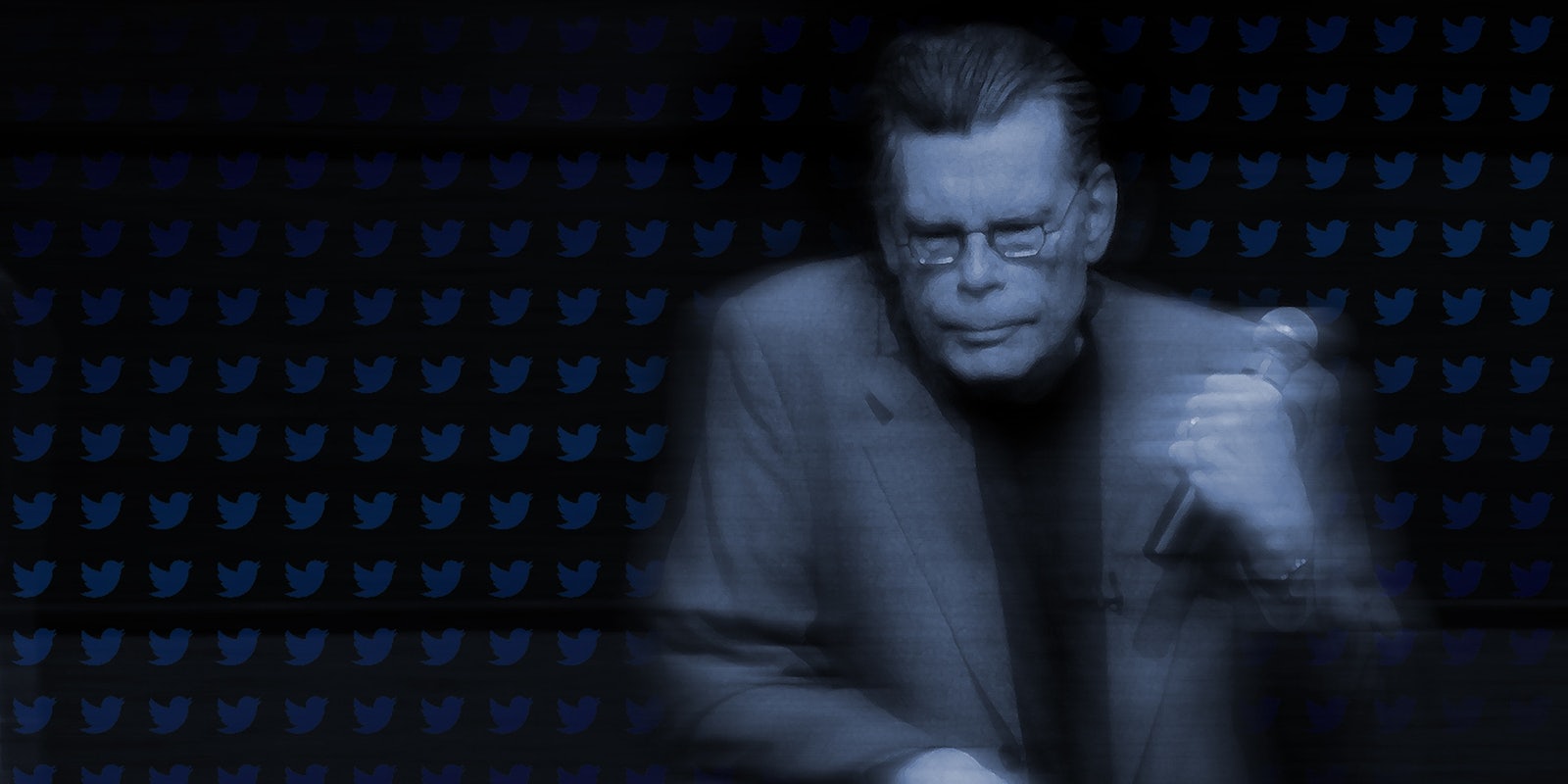Stephen King is stirring up tense feelings on Twitter tonight. Fans and critics alike reacted with outrage after catching wind of a frustratingly vague tweet King made in reference to an opinion piece on Dylan Farrow’s sexual abuse allegations.
The legendary horror author, who joined Twitter just two months ago, has been killing it so far with pithy tweets, like the time he reminded Justin Bieber that pop culture eats the rich. But today he’s experiencing the turbulent side of the microblogging service.
Earlier Monday evening, King’s friend, writer Mary Karr, tweeted a link to a much-discussed blog post by Aaron Bady in the New Inquiry, “Woody Allen’s Good Name.” Though Karr called the piece thoughtful, King’s indirect tweet in response was, well, anything but:
@marykarrlit Boy, I’m stumped on that one. I don’t like to think it’s true, and there’s an element of palpable bitchery there, but…
— Stephen King (@StephenKing) February 3, 2014
Though King didn’t directly reference Karr’s link, it was an easy inference that he was responding to the general subject of Farrow’s allegations of sexual abuse by her father, Woody Allen. Although the Farrow family’s claims about Allen’s abuse have stayed consistent since the early ’90s, when a highly controversial Vanity Fair article first explored the allegations, Hollywood has largely ignored them—until Allen’s recent Golden Globe honors brought Farrow and her mother, Mia, and brother Ronan into the spotlight again. Two decades later, it seems the public is much more willing to engage in debate about whether Allen should be judged as a filmmaker or as an alleged sexual predator.
King’s judgment, however, seemed reserved for Farrow. Although Karr was quick to point out that “palpable bitchery” might have been reserved for the (male) author of the New Inquiry piece, most of the respondents to King on Twitter were horrified that the writer of such proto-feminist works as Carrie could use such a glib insult against an alleged victim of sexual assault.
“Palpable bitchery.” I don’t think Emily Post covered proper etiquette for confronting your molester.
— LisaAngelaPamelaRene (@KiAgainstDworld) February 4, 2014
Sometime afterward, when King climbed back on Twitter, he seemed to be feeling the heat:
Have no opinion on the accusations; hope they’re not true. Probably used the wrong word.
— Stephen King (@StephenKing) February 4, 2014
This response did not draw much lenience:
@StephenKing Probably? This is the kind of nonsense that keeps people from reporting sexual abuse.
— Jess [GuerillaGirl] (@guerillagirl) February 4, 2014
@StephenKing you’d prefer that a child lied rather than confront the reality that we live in a rape apologist society? stephen, stephen.
— Miz Liz Strickland (@yousavedmyheart) February 4, 2014
After spurring another flood of anger, King tried again:
Still learning my way around this thing. Mercy, please.
— Stephen King (@StephenKing) February 4, 2014
Despite many who were willing to be sympathetic to King, the irony of a grown man asking for “mercy” after potentially victim-blaming a woman attempting to draw attention to the cause of rape and assault survivors is too big to miss:
@StephenKing Difference is no one heard her beg for mercy as a child.
— KisseswithKirk (@KathleenMcCart2) February 4, 2014
King is one of many public figures who’ve cast aspersions on Farrow and her family for their accusations against Allen. Notably, Robert Weide, the producer of a PBS documentary on Allen, took to the Daily Beast to write a nearly 6,000-word article in his defense that some have called “dangerously irresponsible.” The Daily Beast later published a much shorter piece, written by an abuse survivor, speculating that Farrow’s claims could have been true.
The type of support that comes from other victims of sexual assault seems to be voiced much more quietly than that which comes from popular beacons with loud platforms.
In this case, King’s Twitter platform has a megaphone attached. And it seems Dylan Farrow’s supporters won’t stop shouting over it any time soon.
Photo via Steph Lawton/Flickr (remix by Jason Reed)


